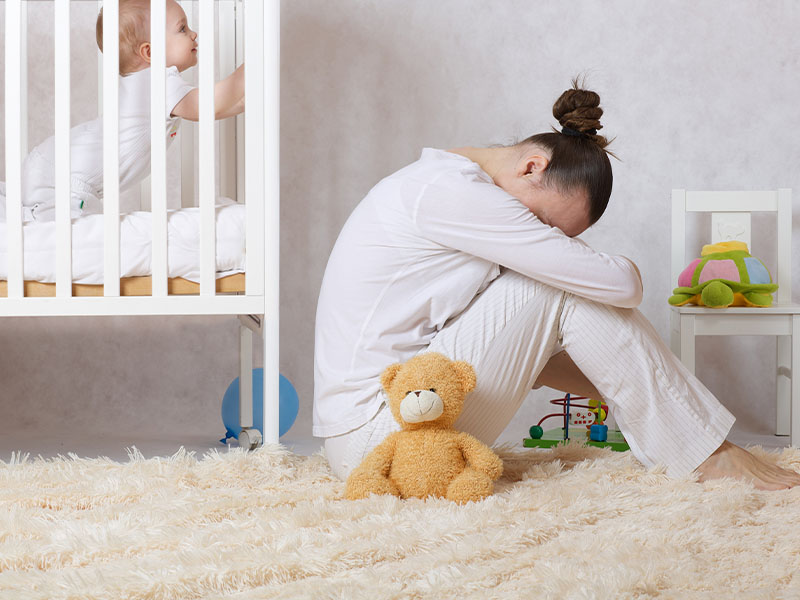DR QURATULAIN ZAIDI of MindNLife looks at the issue of perinatal anxiety and depression and how to support the mental wellbeing of new mothers and mums-to-be.
According to the UK’s National Institute for Health and Care Excellence (NICE), 13 percent of women experience anxiety during pregnancy, with around 12 percent experiencing depression; many are affected by both. Women are more likely to develop depression and anxiety during the first year after childbirth than at any other time in their life.
In my practice here in Hong Kong, I’ve found the most prevalent condition in the perinatal period (that is, during pregnancy and after childbirth) is anxiety, or anxiety and depression – not depression only. Yet, perinatal anxiety in conjunction with depression, or as a separate clinical condition, is little discussed and too rarely recognised.

Recognising the symptoms
Perinatal anxiety is anxiety that occurs any time from when a person becomes pregnant to around a year after giving birth. It’s described as a state of distress or anxiety considered distinct from other anxious states because it primarily relates to worries about the baby’s health, and one’s own experiences related to pregnancy and child birth.
Physical symptoms to look out for
- a churning feeling in your stomach
- feeling light-headed or dizzy
- pins and needles
- feeling restless or unable to sit still
- headaches, backache or other aches and pains
- faster breathing
- a fast, thumping or irregular heartbeat
- sweating or hot flushes
- finding it hard to sleep, even when you have the chance
- grinding your teeth, especially at night
- nausea (feeling sick)
- needing the toilet more or less often
- changes in your sex drive
- having panic attacks
Emotional signals to look out for
- feeling tense, nervous or unable to relax
- feeling like the world is speeding up or slowing down
- having a sense of dread, or fearing the worst
- feeling like other people can see you’re anxious and are looking at you
- feeling like you can’t stop worrying, or that bad things will happen if you stop worrying
- worrying about anxiety itself (for example, about when panic attacks might happen)
- wanting reassurance from other people or worrying that people are angry or upset with you
- worrying that you’re losing touch with reality
- worrying about the future
- rumination – thinking about bad experiences, or thinking over a situation again and again
- depersonalisation – feeling disconnected from your mind or body, or like you’re watching someone else (a type of dissociation)
- derealisation – feeling disconnected from the world around you, or like the world isn’t real (another type of dissociation)
Figures suggest that around a third of women will suffer an anxiety disorder in their lifetime, and the perinatal period is often a trigger. Clinically significant anxiety is very different to normal worry. Everyone has some anxiety, and it’s quite common for new mums to be concerned that something is wrong in their pregnancy or with their baby. However, clinical anxiety is when those worries get in the way of life. Relationships, work and the ability to enjoy the baby can all be affected.
Predisposing factors can include previous anxiety disorders (often undiagnosed), or a previous birth trauma, miscarriage or high-risk pregnancy. Perfectionist tendencies are another factor – constantly waking a baby to check their breathing or googling various health worries is often unproductive, and these behaviours maintain anxiety in the long run.
The impact of anxiety on pregnancy
Perinatal anxiety has been shown to be associated with preterm delivery, which is the birth of an infant at a gestational period of less than 37 weeks. This, in turn, is linked to increased sickness in babies as well as infant mortality.
Studies have shown that the presence of maternal anxiety negatively affects the way the foetal nervous system develops. This occurs via altered functioning of the mother’s hypothalamo-pituitary-adrenal axis, which controls most endocrine functions. The result can be impaired cognitive, motor and behavioural development in the child.
Perinatal anxiety is also associated with negative effects on children’s emotional development, temperament and behavioural reactivity to new situations; they can have delayed muscular and learning skills, hyperactivity and poor attention spans, childhood anxiety, and behavioural aberrations.
How to take charge
Anxiety in pregnancy increases the risk of depression or continued anxiety in the postnatal period. It can start small and get bigger, generalising into all areas and sometimes even causing panic attacks. Trying to address the problem early is the key – it’s crucial that we have early intervention in place to help. Here are some of the ways you can start to tackle the issue.
- Use relaxation techniques like progressive muscle relation, deepbreathing, mindfulness and meditation.
- Ensure you exercise regularly and eat a healthy diet.
- Aim to get the right amount of sleep – this is imperative for keeping anxiety at bay.
- Pay selective attention to other tasks by keeping busy, rather than focusing on rumination; creating therapeutic music playlists is another helpful distraction technique.
- Use your social support network and reach out to friends and family who’ll be able to support you without judgment.
- Be selective and mindful with your information consumption during the perinatal period; limit and regulate your digital presence according to your own needs.
- Consider Cognitive Behavioural Therapy (CBT); this is a known technique to combat anxiety and it works really well in identifying unproductive worries and the negative cycles they create.
While the pregnancy journey is mostly focused on managing physical care for women, the figures quite clearly show that we need to put in measures to ensure women safeguard their emotional and mental wellbeing as well their physical health. I would like to see a greater focus on understanding and supporting mental wellbeing for all pregnant women and new mothers. I’d also welcome a significant increase in early screening for perinatal anxiety and depression so women know in advance how to get help.
Dr Zaidi is a British-registered clinical psychologist who works with individuals, couples and families in her private practice in Central, and as a mental health consultant for a number of NGOs and international corporations.
2521 4668 | info@mindnlife.com
mindnlife.com
This article first appeared in the June 2020 issue of Expat Living magazine. Subscribe now so you never miss an issue.






